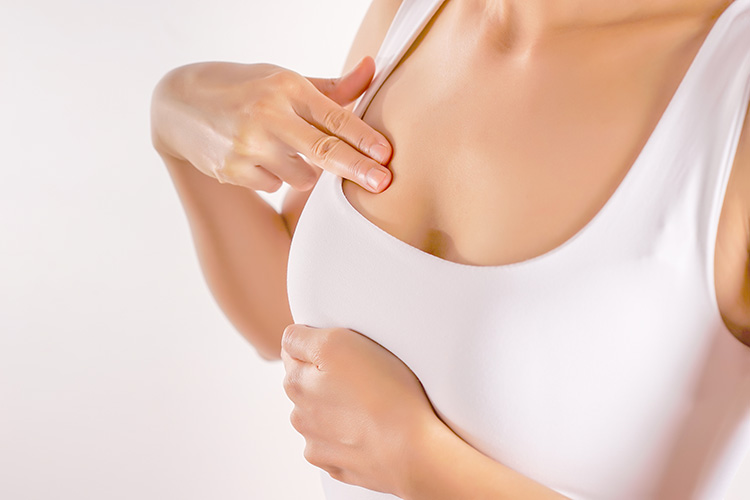Breast Health

Good breast health starts with awareness about your body, what signs to look for with regard to your breasts, and when to consult a doctor.
At Newton-Wellesley OB/GYN, our physicians provide you with personalized counseling for any concerns you may have about your breast health.
Common Breast Conditions
Breast tissue is affected by hormonal changes in your body from adolescence to menopause. Any changes in the shape, tenderness, and size of your breasts may fluctuate throughout your life, which is quite normal. Some common breast concerns that women experience include:
Painful Breasts (Mastalgia). Breast pain generally occurs due to hormonal changes in the body close to or during the menstrual cycle. You can try relieving painful breasts by wearing a well-fitting bra, taking warm or cool showers (as works best for your condition), reduce caffeine intake, or try reducing salt and fat from your diet. If none of these options work, consult your physician.
Fibrous Lumps (Fibroadenomas). The glands and fibrous tissue of the breasts can sometimes feel lumpy to the touch. These are called fibroadenomas, which are mostly harmless and generally painless. The lumps may feel tender around the time of the menstrual cycle. If a lump feels unusual in any way, you should get it checked by your doctor. During the examination, it is important to let your doctor know your complete breast health history.
Cysts. A cyst is a fluid-filled sack in the breast tissue. Cysts generally occur in women between the ages of 35 and 50 and typically disappear after menopause. A cyst can feel soft or firm and may sometimes be painful. In most cases, cysts are harmless, but it is good to get it checked by your doctor to ensure that it is not cancer.
Nipple Discharge. Discharge from the nipple is a common occurrence, especially if you’re a lactating mother. However, you might experience nipple discharge even if you’re not lactating. If you find persistent discharge from the nipples, get it checked by your doctor to rule out cancer or other diseases.
Mastitis (Inflammation of the Breast). Mastitis is the inflammation of breast tissue causing tenderness, pain, or a burning sensation, swelling, and/or redness of the breast. It is generally seen in lactating mothers due to milk being trapped in the breast. The trapped milk can feel like a lump in the breast. In some cases, mastitis may be due to an infection.
To avoid mastitis due to trapped milk or blocked milk ducts, make sure you empty one breast during breastfeeding times before switching to the other side. You can also meet with a lactation consultant who can guide you on proper breastfeeding techniques.
Itchiness of Breast and Nipple. Tender or itchy breasts can be caused by hormonal changes in the days approaching the menstrual cycle. Itchiness of the breast or nipple can also result from atopic dermatitis, which can cause dry skin and itching. Dermatitis could be due to the fabric of your bra.
Sometimes, itchiness can be caused by growing breasts due to pregnancy, weight gain, or puberty. As the skin stretches and tightens around the growing tissue, it can become uncomfortable and itchy.
When to See the Doctor
Knowing what is normal for your breasts is important. This will help you identify different situations and alert you to conditions that need a clinical screening or check.
Your doctor may recommend a clinical breast exam, breast ultrasound, or mammogram, depending on the problem you may be experiencing.
You should get a doctor’s consultation if you find any of the following symptoms:
- A new lump in the breast
- A change in the shape and color of your breast
- A change in your nipple (if it becomes inverted)
- A puckering or dimpling of the skin on your breast
- Persistent pain in the breast
- Persistent itchiness accompanied by pain, nipple discharge, or lumps
Breast Care at Newton-Wellesley
Breast health is an integral part of women’s health. If you are experiencing any discomfort with your breasts, please call us in Newton at (617) 332-2345 or Walpole at (508) 668-5555 to schedule an appointment. For your convenience, you may also request an appointment online.

